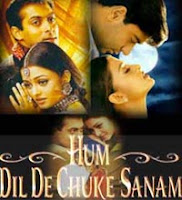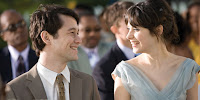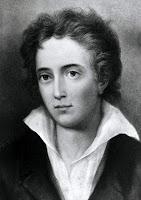 So, for the past week or so I was stuck at home with a bad throat infection. I couldn’t talk (except on Twitter!), or eat anything but soup, pudding, and tea (I’m thinking about writing a diet book). Not much fun. But here is what I did get to do:
So, for the past week or so I was stuck at home with a bad throat infection. I couldn’t talk (except on Twitter!), or eat anything but soup, pudding, and tea (I’m thinking about writing a diet book). Not much fun. But here is what I did get to do:
1) Turn in the Christmas novella!
2) Write an “Undone” short story! (which is getting turned in today, hopefully)
3) Played around with a new “French Revolution vampires” story idea (and if the hero just happens to be tall, blond, and runs a scandalous gambling club in the Palais-Royal, that is entirely a coincidence…)
4) Read some of the books I picked up at RWA
5) Watched movies. Lots of movies. (And North & South again. Nothing restores health like Mr. Thornton’s dark glowering…)
One of those movies was a Bollywood production called Hum Dil De Chuke Sanam. I confess to a crazed love of Bollywood films, though sadly I haven’t seen very many, being limited to whatever is on Netflix. I also have to be in just the right mood, with lots of time (these are long movies) and plenty of palak paneer and chicken vindaloo take-away. I love the bright, beautiful costumes (even heroines who are meant to be very poor have sequined saris–and back-up dancers whenever she needs them), the glittery song and dance numbers (which happen at the most giddy random moments), and most of all the unabashed romanticism. These characters have big, wild, passionate emotions, which they express in a big way, with lots of tears, shouts, and music.
 In this film, our heroine Nendini falls in love with the cute, nice, but sort of goofball-ish singer Semeer, who also falls in love with her. But her father sends Semeer away and makes her marry cute, nice, but sort of intense lawyer Vanraj (who can’t sing at all). She looks like she’s going to the scaffold all during the ultra-lavish wedding scene, but poor Vanraj doesn’t seem to notice. He later finds out that the reason his new wife wafts around the house like a sad ghost is because she still loves Semeer, who has gone off to Italy to pursue his singing career. Vanraj takes Nendini to Italy to find her first love. It takes a while (and an accident or two, plus at least 5 musical numbers), but eventually Nendini learns the True Meaning of Love, and there’s a big, tearful reunion on a starlit bridge. I admit–it was totally, totally great.
In this film, our heroine Nendini falls in love with the cute, nice, but sort of goofball-ish singer Semeer, who also falls in love with her. But her father sends Semeer away and makes her marry cute, nice, but sort of intense lawyer Vanraj (who can’t sing at all). She looks like she’s going to the scaffold all during the ultra-lavish wedding scene, but poor Vanraj doesn’t seem to notice. He later finds out that the reason his new wife wafts around the house like a sad ghost is because she still loves Semeer, who has gone off to Italy to pursue his singing career. Vanraj takes Nendini to Italy to find her first love. It takes a while (and an accident or two, plus at least 5 musical numbers), but eventually Nendini learns the True Meaning of Love, and there’s a big, tearful reunion on a starlit bridge. I admit–it was totally, totally great.
 It can be hard to find an American film this open to raw emotion, not to mention big production numbers. On Sunday, to celebrate my return to the land of the living, some friends took me to see the movie 500 Days of Summer. I loved this movie, too. I’m not generally a fan of the so-called romantic comedy genre, but this one doesn’t really fall into that category. It was entirely unpredictable, told from the male POV (Tom is madly in love with Summer, who likes him but says she will never marry), non-chronological, and even had a black-and-white musical number! Roger Ebert gave it 4 stars and says, “Summer remains mysterious all through the film, perhaps because we persist with Tom in expecting her to cave in. When we realize she is not required to in this movie, because it’s not playing by the Hollywood rules, we perk up. Anything could happen. The kaleidoscopic time structure breaks the shackles of the three-act grid and thrashes about with the freedom of romantic confusion.” (Maybe it’s a lesson to us writers to not “play by the rules,” too).
It can be hard to find an American film this open to raw emotion, not to mention big production numbers. On Sunday, to celebrate my return to the land of the living, some friends took me to see the movie 500 Days of Summer. I loved this movie, too. I’m not generally a fan of the so-called romantic comedy genre, but this one doesn’t really fall into that category. It was entirely unpredictable, told from the male POV (Tom is madly in love with Summer, who likes him but says she will never marry), non-chronological, and even had a black-and-white musical number! Roger Ebert gave it 4 stars and says, “Summer remains mysterious all through the film, perhaps because we persist with Tom in expecting her to cave in. When we realize she is not required to in this movie, because it’s not playing by the Hollywood rules, we perk up. Anything could happen. The kaleidoscopic time structure breaks the shackles of the three-act grid and thrashes about with the freedom of romantic confusion.” (Maybe it’s a lesson to us writers to not “play by the rules,” too).
 Is it “romantic”? Well–yes, in it’s own crazy way. I guess I was thinking about all this today because it’s the birthday of Percy Bysshe Shelley (August 4, 1792–July 8, 1822). You know, the guy who helped invent “Romantic” poetry and said, “Soul meets soul on lovers’ lips” and “All love is sweet, Given or returned. Common as light is love, and its familiar voice wearies not ever.”
Is it “romantic”? Well–yes, in it’s own crazy way. I guess I was thinking about all this today because it’s the birthday of Percy Bysshe Shelley (August 4, 1792–July 8, 1822). You know, the guy who helped invent “Romantic” poetry and said, “Soul meets soul on lovers’ lips” and “All love is sweet, Given or returned. Common as light is love, and its familiar voice wearies not ever.”
But what does “romance” mean to you?? What are some movies or books you find particularly romantic? And what’s your favorite Shelley poem?














